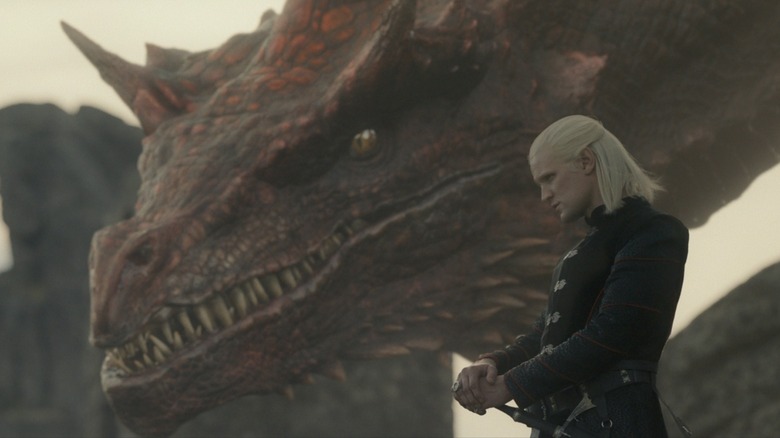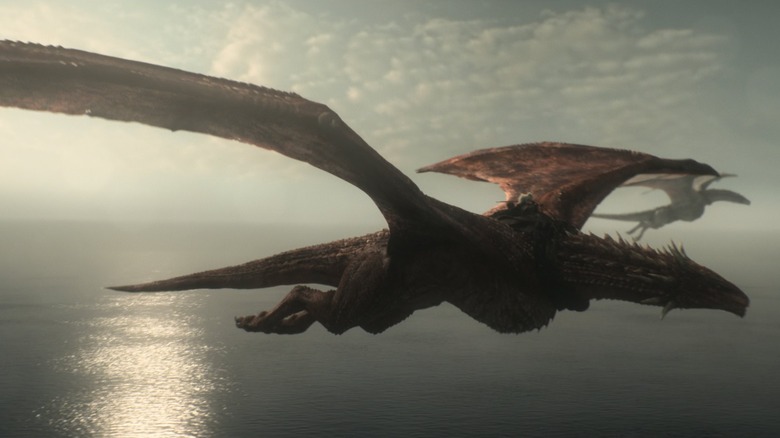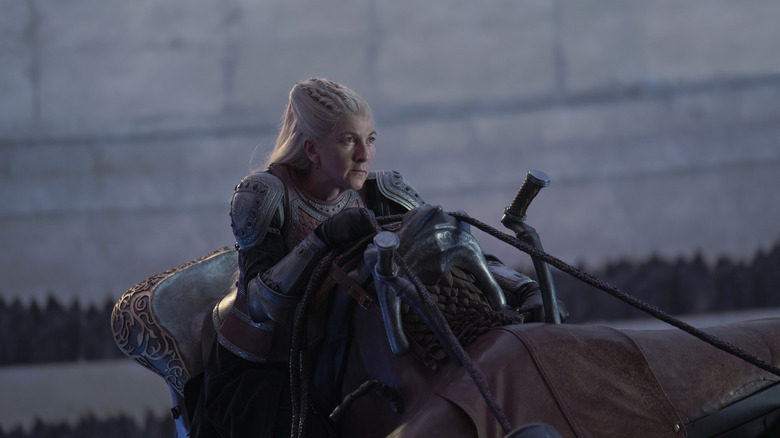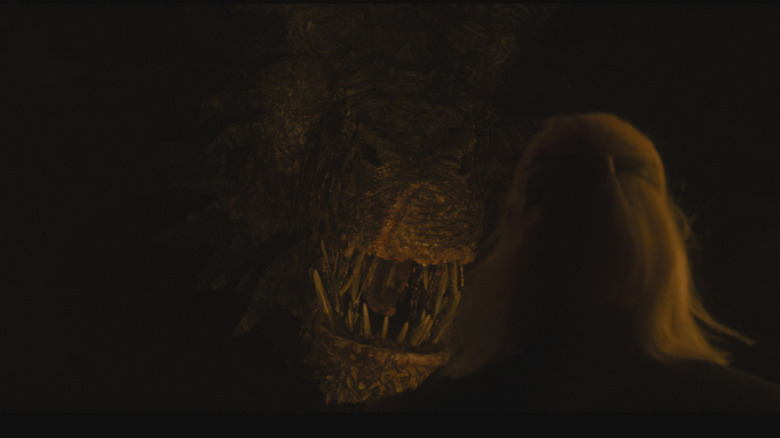House Of The Dragon Is Setting Up A Medieval Nuclear War
This article contains spoilers for the season finale of "House of the Dragon."
War is coming to Westeros and despite everyone's best (and less-than-best) intentions, none can prevent the Targaryen family drama from spilling over into the all-consuming Dance of the Dragons. After the death of King Viserys (Paddy Considine) spurred Queen Alicent (Olivia Cooke) into instigating a coup for the Iron Throne in last week's penultimate episode, the season finale of "House of the Dragon" sees the newly-crowned Queen Rhaenyra (Emma D'Arcy) respond in kind by asserting her rightful claim. In stark contrast to the war-mongering men advising her every move, however, the reluctant ruler considers painting the Seven Kingdoms in fire and blood as a measure of last resort.
In many ways, the entirety of season 1 has steadily built up the cold war brewing between those who support the Hightowers (the so-called "Greens") and those who swore fealty to Viserys' chosen heir, Rhaenyra and her "Blacks." Though we've seen plenty of action and intrigue that lives up to the standards set by "Game of Thrones," the finale pointedly ends on the very brink of outright civil war. And the first "shots" in this conflict, fittingly enough, have been fired by dragons.
The series creators have emphasized the significance and prevalence of the dragons that populate "House of the Dragon," playing up the bond between dragon and rider along with their destructive capabilities. In the inevitable war to come, it stood to reason that these fearsome monsters would end up playing a huge role ... but it took until the finale for the parallel between the Targaryen dragons and Cold War-era nuclear weapons to fully come into focus. The implications for season 2, meanwhile, couldn't possibly be more dire.
A fire-breathing arms race
Upon getting over the shock of the death of her father Viserys, Queen Alicent's seizure of the throne through her son Aegon (Tom Glynn-Carney), and her own harrowing childbirth gone wrong, it takes little time at all for the extent of her predicament to fully dawn on Rhaenyra. Dragonstone is too far removed from the center of power in King's Landing, there's not nearly enough men to properly guard the island stronghold, and the Blacks have even fewer allies that they can reliably count on should things devolve into war. For better or worse, it's during an early small council scene that Prince Daemon (Matt Smith) voices what everyone was thinking: Soldiers are good, but dragons are better.
In rapidly listing off the dozen or so battle-ready adult dragons at their disposal (both claimed and unclaimed) and sizing up the paltry four that belong to the Greens, Daemon treats their most powerful tools as essentially weapons of mass destruction. They have more dragons than young King Aegon does, therefore they should handily win the war in no time at all. When Rhaenyra balks at this, pointing out that Westorosi history is littered with the scars of dragonfire burning everything in their path and that she has no wish "to rule over a kingdom of ash and bone," it can't help but bring to mind countless depictions of scenes straight out of the Cold War playbook.
Nuclear weapons were (and continue to be) the game-changer in any modern conflict between superpowers, but their very nature means complete and utter annihilation of everything within the blast radius. Dragons, for all intents and purposes, are the "House of the Dragon" equivalent of the atom bomb. They aren't to be used lightly ... or at all, for that matter.
Dragon deterrent?
Leave it to "House of the Dragon" to cause audiences to cry foul over the fact that a main character, one of the fan-favorites in the entire show to this point, actually had the restraint to avoid burning her enemies to death in a brutal act that would've ended a civil war before it had even begun. The remarkable restraint of Princess Rhaenys (Eve Best) in the last episode may have led to controversy (in-universe as well, as seen by the bloodthirsty Daemon in this latest episode, which certainly speaks volumes), but that act of mercy also showcased just how effective dragons as a deterrent can be ... to this point, at least.
The finale, titled "The Black Queen," soon features an envoy led by Hand of the King Otto Hightower (Rhys Ifans) sent to Dragonstone with terms of peace. Likely influenced by Rhaenys' spectacular display during Aegon's coronation, Otto offers one last reminder of the childhood friendship between Alicent and Rhaenyra in the hopes of avoiding bloodshed altogether — though not at the expense of Alicent giving up the Iron Throne, notably. Rhaenyra, of course, makes a memorable entrance herself on the back of her dragon Syrax, flaunting the winged power of the Blacks in the hopes of distracting the Greens from their disadvantage in numbers when it comes to more traditional armies. But throughout all this posturing and politicking, it remains clear that neither side desires war.
Rhaenyra's hesitancy to unleash dragons the way Daemon urges her to neatly parallels the very real-world fear surrounding the mutually assured destruction of turning the key and hitting the big red button that would've brought nuclear hellfire down on the globe during the Cold War (and beyond). We narrowly avoided that fate, but can the Targaryens do the same?
Controlling the uncontrollable
Perhaps the biggest piece of evidence in favor of dragons standing in for nuclear war comes from the fact that such weapons tend to exist far beyond the whims of us mere mortals. During the Cold War and in the decades since, humanity has stood at the precipice of nuclear destruction more times than we'd like to think (as profiled in this relatively recent firsthand account published by The Guardian). When dabbling in powers far beyond most of our collective understanding and placed in the hands of politicians with agendas, after all, it's inevitable that circumstances will spiral out of control. One doesn't have to look too far to see the same exact thing unfolding in the latter moments of the "House of the Dragon" finale.
Perhaps no sequence better sums up the show's stance on dragon warfare and its consequences better than the aerial pursuit that quickly turns tragic. When Rhaenyra sends her young son Lucerys (Elliot Grihault) to treat with the Baratheons of Storm's End, the prince finds his one-eyed uncle and bitter enemy Aemond (Ewan Mitchell) has already beaten him to the punch atop the massive and ancient dragon Vermithor. The petty personal grievances between the two young men spills over in no time at all, leading to a tense chase sequence that ends with both dragons taking things much too far. Against Lucerys' wishes, Arrax takes a run at the much bigger beast and, to Aemond's horror, Vermithor nonchalantly snaps his jaws and kills Lucerys in one fell swoop. In the end, it won't matter what either prince intended — only the end result that will undoubtedly lead to countless more lives lost.
By saving its most potent metaphor for last, "House of the Dragon" showed how dragon-riding spectacle can be the ultimate example of being careful what we wish for.



